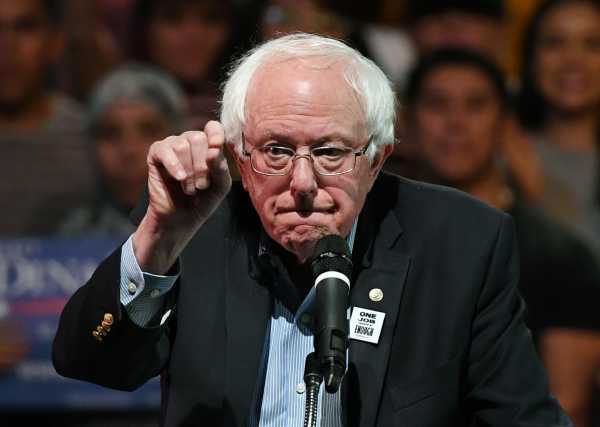
Sen. Bernie Sanders (I-VT) and Rep. Ro Khanna (D-CA) have a new plan to bring down American drug prices, and it sure looks a lot like a recent proposal from President Trump.
The Sanders-Khanna legislation, released on Tuesday, attacks two issues at once: the disproportionately high prices that America pays for prescription drugs when compared to other countries, and the years-long monopolies that drug manufacturers are granted under US law when they develop a new treatment.
The bill, called the Prescription Drug Price Relief Act, is actually pretty simple in its mechanics: If the US price for a medication is higher than in other developed countries, the drugmaker’s monopoly would be ended and generic competitors could enter the market to sell alternative versions of the drug at a lower price.
This is how it would work, per a summary from Sanders’s and Khanna’s offices:
- Every year, the federal health department would identify “excessively priced” drugs: medications priced higher in the US than the average price in Canada, the United Kingdom, Germany, France, and Japan.
- The health secretary could also label a drug as “excessively priced” based on other criteria, including the size of the patient population, the value of the drug to patients, and the costs of developing the drug (among other metrics).
- If a drug is deemed “excessively priced,” its manufacturer would lose the patent protections that prevent competitors from developing generic versions of the drug.
- New generic competitors could then start selling their own iterations of the drug, though they would be required to pay a “reasonable royalty” to the drug’s original manufacturer.
It sounds pretty straightforward, and that could help sell the public on the idea, as Politico’s Sarah Karlin-Smith smartly noted. But nothing regarding drug prices is actually simple.
Experts worry a lot of drugs could become “excessively priced” under this plan
The plan has skeptics, and they aren’t just experts on the right who loathe the idea of any kind of government price controls.
Walid Gellad, who leads the University of Pittsburgh’s Center for Pharmaceutical Policy and Prescribing, generally supports aggressive action to bring down drug prices but said he worries the Sanders-Khanna legislation has such broad criteria that almost every patent-protected drug could end up being classified as excessively priced.
“In my view, it’s generally not a good idea to address high drug prices by labeling almost every brand-name drug as excessively priced and then removing all patent rights from the manufacturer,” Gellad told me by email. “That doesn’t strike the balance we need to address drug prices while maintaining our system of innovation.”
I spoke with staffers who worked on the bill about this issue. They told me their theory of the case: Drug companies will have the information they need — what they charge in the United States, what they charge elsewhere — to lower their prices enough to avoid having their patents invalidated. The staffers also emphasized that the reference points are other wealthy, developed countries.
Democratic aides believe that most drug makers will do what they must to maintain a monopoly in the United States. Whether they’re correct about that assumption is one of the most important outstanding questions for a plan like this.
The other big question, as several experts told Karlin-Smith and others also pointed out to me, is why should the US let other countries effectively regulate its prices, rather than make its own determinations about the proper value of a drug?
“I think it’s just lazy; it’s fundamentally lazy,” said Craig Garthwaite, a health economist at Northwestern University’s Kellogg School of Management. “I think they’re doing it this way because they don’t want to have this debate.”
We’ve seen other plans like this recently — from the Trump administration
But perhaps the most interesting feature of the Sanders-Khanna bill is the way it dovetails with a recent proposal from the Trump administration. The administration wants Medicare Part B, which covers hospital and cancer drugs, to start paying a price based on an average of what certain European countries pay for specific medications.
The new legislation from these two progressive lawmakers is much grander in scope — applying to the entire US market instead of “just” Medicare — but the expected effect, and potential risks, would likely have some overlap.
What some economists fear is if foreign countries don’t raise their prices at all. US prices come down to meet them, and then drug companies are just making a lot less money, which could in turn lead to less drug development. The pharmaceutical industry is already warning that price controls could discourage companies from pursuing breakthrough but expensive-to-develop treatments.
Of course, that is the industry’s standard response to most proposals to crack down on drug prices and it is usually greeted by ample skepticism, particularly from the left, which sees an industry that’s currently making robust profits off America’s world-topping drug prices. Various studies have also questioned the industry’s spin that America’s current high prices are justified by their spending on R&D.
But economists across the spectrum do believe there is a point at which fewer drugs would be developed if pharma’s revenue is cut and that does introduce some difficult trade-offs. That isn’t to say the Sanders-Khanna bill crosses that line — it’s a hard thing to gauge — but some right-leaning economists believe it would.
“Investment and R&D, that’s going to go down,” Garthwaite said. “Foreign prices wouldn’t come down enough.”
But these are, for now, abstract concerns. The Sanders-Khanna bill is almost certainly going nowhere under a Republican-controlled Senate, any shared DNA with Trump’s plan aside.
But it does suggest there could be some room for compromise between the administration and Democrats in Congress on drug prices if there were the political will to work together. They have identified some of the same problems and the same solutions on an issue that Americans have consistently rated as one of their most urgent.
Sourse: breakingnews.ie
0.00 (0%) 0 votes


































